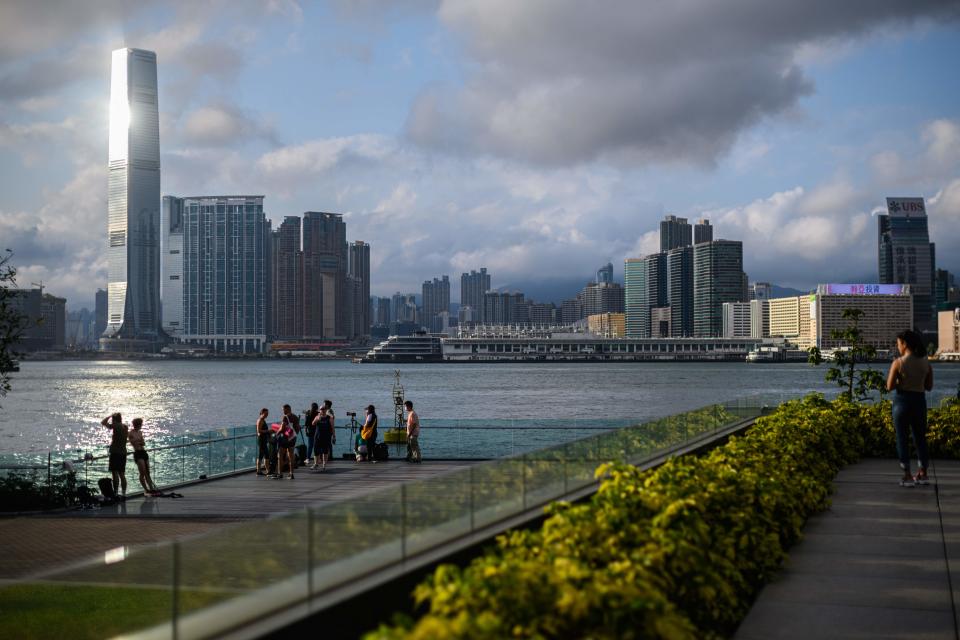US and China heading towards a cold war: Ian Bremmer
Eurasia Group Founder and CEO Ian Bremmer believes that the U.S. and China are heading towards a cold war, as tensions rise over the issue in Hong Kong.
“We are in a technology cold war,” Bremmer said on Yahoo Finance’s “On The Move.” “The fact is that the Chinese will not let some dominant U.S. tech companies into China — the Facebooks, the Amazons, the Twitter. … [so] why should we allow Chinese companies in the United States … if they're not going to give reciprocity to American firms?”
And given the recent escalation over the issue of Hong Kong’s autonomy, “we are not yet in a cold war with China writ large,” though, he said, “we are heading in that direction.” China’s legislature on Thursday approved a resolution to impose national-security laws on Hong Kong, which activists say will undermine the territory’s partial autonomy.
Bremmer pointed to the fact that a wide range of U.S. industries – including sports, film, banking, and so on – are rethinking the notion that the future of their business was in China.
“Those companies don't see the same options for themselves in China they did before,” Bremmer said. “There's no rule of law in China, no independent judiciary. [And] Chinese companies are getting stronger. They're using their competitive advantage with their alignment with the Chinese government, their access to Chinese credit, so that's becoming a problem.”
But at the same time, that doesn’t make Chinese companies like Huawei “evil,” said, Bremmer, it just made them diametrically opposed to American ones. “There's a zero-sum-ness in that relationship,” he said.

US relationship with Hong Kong unclear
China had recently imposed a national security law on Hong Kong, a global financial center. The Trump administration also announced the same week that it was no longer considering the former British colony to be autonomous from the mainland.
Since the British returned Hong Kong to China in 1997, the city has operated under a system of self-governance, under a “one country, two systems” rule which allowed it to maintain its financial and political system distinct from Beijing’s.
While experts believe that the recent move by China, as well as the U.S., could undermine business confidence and further worsen the relationship between the two economic powerhouses — Bremmer didn’t see that scenario playing out just yet.
“The big question going forward is: will the Americans withdraw the special trade status that we afford Hong Kong, completely within our rights to do so,” Bremmer said. “I don't think it will happen because there are a lot of American companies that do business in Hong Kong that will be adversely impacted if we take that decision. They will lobby the Trump administration not to put that in place.”
In any case, “we don't want to hurt Hong Kong more than we hurt mainland China,” Bremmer said, adding: “I expect we will put sanctions on a bunch of mid-level Chinese officials that have been involved in the crackdown … [and] we might say that Hong Kong will have export tariffs that are similar to mainland China.”
But the sentiment in Hong Kong as a stable global financial center may be shaken: “Do we trust that Hong Kong can continue to exist in this way, and how will we act as a consequence?,” Bremmer said.
Investors and businesses may turn to other countries and cities operating under rule of law — such as Singapore, Seoul or Tokyo — Bremmer suggested.
But, Bremmer said, “as we are moving towards a broader cold war, the ability of Hong Kong to act as an entrep?t is really going away and they will suffer mightily as a consequence of that.”
—
Aarthi is a reporter for Yahoo Finance. Follow her on Twitter @aarthiswami.
Read more:
Hong Kong protests 'could have ripple effects very easily into China,' Eurasia Group's Hirson says
Kyle Bass: Hong Kong's political turmoil occurs atop a 'financial time bomb'
Read the latest financial and business news from Yahoo Finance
Follow Yahoo Finance on Twitter, Facebook, Instagram, Flipboard, SmartNews, LinkedIn, YouTube, and reddit.

 Yahoo Finance
Yahoo Finance 